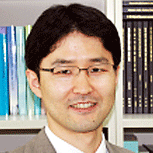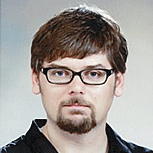|
|
|
|
|

|
 |
Sung-Hee Lee (   ) ) |
| @ KAIST GSCT, S. Korea |
| Title: Animation of interactive, physics-based human characters for an AR environment |
|
|
|
|
Sung-Hee Lee’s research interests include physics-based computer graphics/animation and humanoid robotics, specifically in autonomous human characters and humanoid robots, biomechanical human modeling, physics simulation, and novel user interfaces for creating digital contents.
He received the Ph.D. degree in Computer Science from University of California, Los Angeles, USA, in 2008, and the B.S. and the M.S. degree in Mechanical Engineering from Seoul National University, Korea, in 1996 and 2000, respectively.
He is currently an Assistant Professor in the Graduate School of Culture Technology at KAIST, South Korea. He was previosely an Assistant Professor
with the School of Information and Communications at Gwangju Institute of Science and Technology. Prior to joining GIST in 2010 he was a Postdoctoral researcher at UCLA from 2008 to 2009, and at Honda Research Institute, CA, from 2009 to 2010. He also has held positions at Rhythm & Hues Studios, CA, USA (Software Intern, 2008), Microsoft Research, WA, USA (Research Intern, 2007), Honda Research Institute, CA, USA (Research Intern, 2006), Korea Institute of Science and Technology (Visiting Scholar, 2003), and Samsung Advanced Institute of Science and Technology (Researcher, 2000-2002).
He was awarded Outstanding Ph.D. in Computer Science and Northrup Grumman Outstanding Graduate Research Award from UCLA in 2009.
|
|
|
|

|
 |
Ian Oakley (   ) ) |
| @ UNIST, S. Korea |
Title: On and offline tangible interaction:
studying the secret lives of augmented objects |
|
|
|
|
|
|
|
|
|
|
|
Antonis A. Argyros (Αντώνης Αργυρός) is an Associate Professor at the Computer Science Department, University of Crete and a researcher at the Institute of Computer Science (ICS), Foundation for Research and Technology-Hellas (FORTH) in Heraklion, Crete, Greece. He received a B.Sc. degree in Computer Science (1989) and a M.Sc. degree in Computer Science (1992), both from the Computer Science Department, University of Crete. On July 1996, he completed his PhD on visual motion analysis at the same Department. He has been a postdoctoral fellow at the Computational Vision and Active Perception Laboratory (CVAP) at the Royal Institute of Technology in Stockholm, Sweden. Since 1999, as a member of the Computational Vision and Robotics Laboratory (CVRL) of FORTH-ICS, he has been involved in many RTD projects in computer vision, image analysis and robotics.
Antonis Argyros is an area editor for the Computer Vision and Image Understanding Journal (CVIU), member of the Editorial Board of the IET Image Processing Journal and one of the general chairs of the 11th European Conference in Computer Vision (ECCV'2010, Heraklion, Crete). He is also a faculty member of the Brain and Mind interdisciplinary graduate program and a member of the Strategy Task Group of the European Consortium for Informatics and Mathematics (ERCIM).
|
|
|
|
|
 |
Graham Wakefield (   ) ) |
| @ KAIST GSCT, S. Korea |
| Title: Becoming-there: Natural Presence in an Art of Artificial Ecologies |
|
|
|
Graham Wakefield is a Visiting Professor in the Graduate School of Culture Technology at KAIST, South Korea. He holds a BA in Philosophy from the University of Warwick UK, a Master in Composition from Goldsmiths College University of London, UK and a Ph.D in Media Arts & Technology from the University of California Santa Barbara, USA. His research has evolved from computer music composition to the generation of open-ended environments for exploratory experience, emphasizing continuation over closure. This work is expressed through software design for creative coding, and immersive artworks of artificial ecosystems (both leveraging live system evolution through dynamic compilation). Graham played a central role in the development of software systems and authoring content for the AlloSphere facility: a unique multi-user spherical immersive instrument in the California Nano-Systems Institute. Graham is also a software developer for Cycling '74, co-authoring the Gen extension for the widely-used media arts environment Max/MSP/Jitter. His works and publications have been performed, exhibited and presented at international events including SIGGRAPH, ICMC, NIME, EvoWorkshops and ISEA.
|
|
|
|
|
 |
Min-Hyuk Kim (   ) ) |
| @ KAIST VCLAB, S. Korea |
| Title: Visual Perception for High-Fidelity Representation in Graphics |
|
|
|
|
|
|
|
|
|
|
|
|
|
|
|